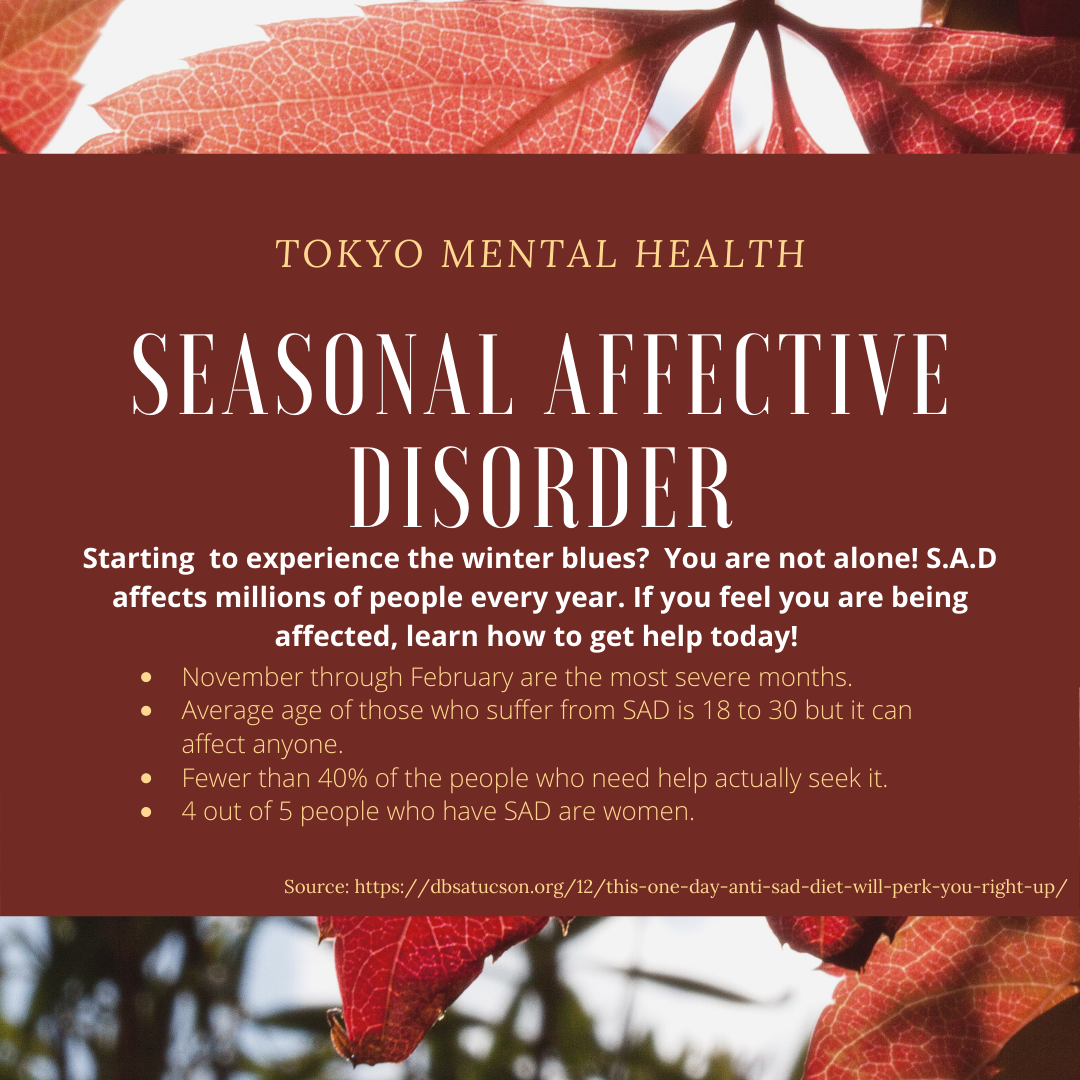Angelica Gomez
What is it?
Seasonal Affective Disorder, also known as S.A.D, is a type of depression that is associated with the changes in seasons. It most often starts in the Fall and continues on into the Winter. There are instances in which S.A.D affects people in the Spring as well as the Summer, but this isn’t as common.
The actual cause of S.A.D still remains unknown but there are a lot of contributing factors to the disorder, including disruption of melatonin levels, causing your mood and sleep patterns to be changed. Your serotonin levels, which have to do with your mood, may also be dropping. An example of this could be reduced sunlight because this can cause your serotonin levels to change; this often times could be a trigger for depression.
What are the symptoms?
- having little to no energy
- sleeping problems
- feeling irritated quickly
- feeling hopeless
- feeling sluggish
- social isolation
- changes in weight
- losing interest in activities you normally enjoy
In the Fall/ Winter the most common symptoms also include: oversleeping, weight gain, low energy, constantly feeling tired, and appetite changes.
Who is affected?
- Occurs more frequently in women than men.
- Affects young adults ages 18-30 more than older adults, but it is still possible to affect people of other ages outside of this range.
How can I treat it?
S.A.D is often treated in many different ways, depending on the individual. Some people seem to feel better after using light therapy. This is when you use a specific light bulb to expose yourself to a certain type of light. It’s goal is to mimic the outdoor lighting, causing changes in brain chemicals which, as a result, cause changes in your mood.
Other patients seem to turn towards medication. Your doctor can recommend certain medications such as antidepressants to use throughout the treatment period.
If medications or the lights aren’t what you prefer there are also other natural options such as meditating, music therapy or relaxation techniques that you can try out.
There are also a couple of things that you can do at home on your own:
- Exercise: moving and keeping your body active will help you produce endorphins which are also known as happy hormones.
- Ditch comfort food: it may make you feel better at the moment, but all of those carbohydrates make you feel sluggish after a while. It is important to eat healthy and try to stay on top of your diet in order to feel better physically.
- Think positive thoughts: remind yourself everyday that you are important and that you matter. You are loved, and you can get through the day.
- Motivate yourself: plan ahead. Write down things that you are looking forward to so that whenever you feel hopeless or lonely you can look ahead and see that you have a purpose and that there are good things coming in the near future.
There are many options that you can choose from when trying to treat S.A.D, so try not to feel discouraged. Instead, try to find one that works for you and, during this change in seasons, make sure to use these techniques to try and help you get through the tough transition.
Make sure to seek help if you feel that you need it! Feeling sad here and there for a couple of days is normal, but once the sadness starts to interfere with your everyday activities, it is time to get some professional help. If S.A.D goes untreated it is possible for you to develop more severe problems. These include things such as substance misuse, problems at work and school, and even social withdrawal. It is important to recognize that seeking help is the best option in terms of trying to treat the depression caused by the seasonal changes.
You can book an appointment online with one of our licensed counselors here.
Sources:
[email protected]. “This One-Day Anti-SAD Diet Will Perk You Right Up.” Depression & Bipolar Support Alliance Tucson Arizona, 18 Dec. 2017, dbsatucson.org/12/this-one-day-anti-sad-diet-will-perk-you-right-up/
Caroline. “Mental Health Monday: Tips For Dealing With Seasonal Affective Disorder.” Journey to Wellness, 25 Jan. 2014, https://fightingforwellness.wordpress.com/2013/02/04/mental-health-monday-tips-for-dealing-with-seasonal-affective-disorder/
“Seasonal Affective Disorder (SAD).” Mayo Clinic, Mayo Foundation for Medical Education and Research, 25 Oct. 2017, https://www.mayoclinic.org/diseases-conditions/seasonal-affective-disorder/diagnosis-treatment/drc-20364722
